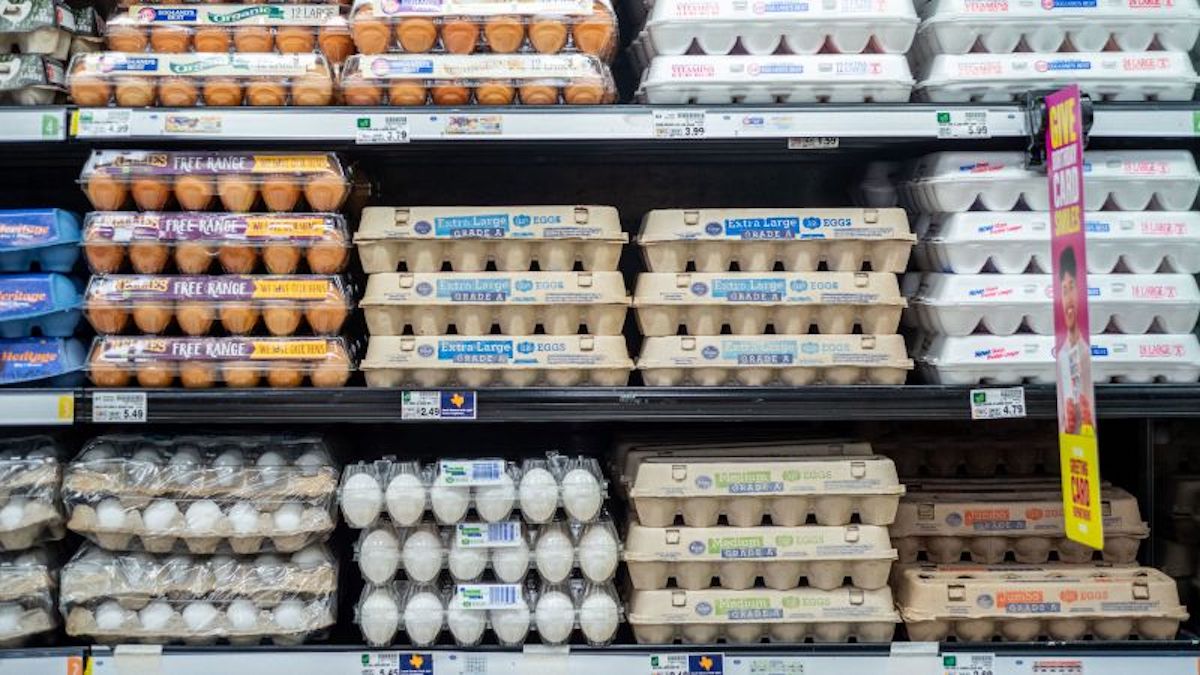Eggs have gotten a lot more expensive this year.
New York (CNN) --
Several grocery items have gotten more expensive this year.
But nothing comes close to rising egg prices.
Through November of this year, without adjusting for seasonal changes, egg prices increased 49%, according to data from the Bureau of Labor Statistics.
Since earlier this year, a deadly bird flu has been decimating poultry flocks, specifically turkeys and laying hens.
That is one of the reasons for the relentless rise in prices.
But the situation has been exacerbated by high feed and energy costs for producers, as well as high demand in the supermarket.
Why is food getting more and more expensive?
we explain
Experts think the peak is over, but until these conditions improve, you could still pay more for eggs at the supermarket.
Wholesale prices reach a record
Bird flu has been a problem in the US for several months, but in recent weeks wholesale prices have hit records.
advertising
Since last week, "prices have been rising for nine straight weeks ... setting new daily records since Thanksgiving week," said Karyn Rispoli, editor of Egg Price Current for Urner Barry, which provides egg market data. food.
Midwestern large eggs, the benchmark for eggs sold in the shell, hit $5.46 a dozen on Friday, Rispoli said, citing data from Urner Barry.
At this time last year, Urner Berry data shows, that price was around $1.70.
Eggs have gotten a lot more expensive this year.
Brandon Bell/Getty Images
One of the reasons for the increase?
There is not enough supply.
“There just hasn't been enough production to support the incredibly strong retail demand that we've seen this year,” Rispoli said.
The supply has been limited by the deadly bird flu.
The current outbreak of highly pathogenic avian influenza began in the US around February and has persisted throughout the year.
The last major outbreak of bird flu in the United States was in 2015. But that one was contained in June of that year, said Brian Earnest, senior animal protein economist at CoBank.
“This year, we have continued to see flock depopulations throughout the year, and are expected to continue to see that through 2023,” he said, noting that “we are going to see a tight supply situation and elevated price environment going forward.”
About 60 million birds have died from the disease so far, according to the USDA.
Of those, about 43 million are laying hens, according to USDA data provided by the American Egg Board, a farmer-funded group that markets eggs.
Still, farmers have been able to moderate losses.
“Our growers learned many hard lessons from 2015,” said Emily Metz, CEO of the American Egg Board.
Some farmers have been able to restock their flocks, lessening the net impact on flock size and egg supply.
As of early December, there were about 308 million hens laying eggs for food, up from 328 million in December 2021, according to the USDA.
Shortage of supply isn't the only thing contributing to rising egg prices, Metz said.
Higher fuel, feed and other costs to the producer are also pushing up wholesale prices, he said.
And then there is the huge demand for eggs, which increases at this time of year.
The demand for eggs remains high
People buy more eggs during the holidays, when they bake and cook more and eat breakfast at home more often.
Wholesale prices tend to rise in the winter because of these habits, Earnest said.
That has "caused a very strong market condition."
Year-round demand for eggs has also been strong.
Although prices have soared, egg sales are only down 2% per unit at retail in the year to December 4, according to data from IRI, a market research firm.
Shoppers have been accepting high prices at the grocery store as they withdraw from restaurant visits.
And while eggs have gotten more expensive, they still cost less than other proteins.
A deadly bird flu has killed millions of poultry this year.
Mario Tama/Getty Images
As that holiday demand spike passes, wholesale prices are expected to drop.
"Based on current trading values and market conditions, it looks like the market may finally have peaked," Rispoli said.
Friday's wholesale prices were the same as Thursday's, the first time prices had held steady since October, she said.
“Several suppliers have informed us…that their orders are slowing down” in the week before Christmas, he added.
By then, "most grocery stores have removed the inventory they'll need for the holidays."
It could take another three to six months for prices to moderate at retail, said KK Davey, chair of IRI and NPD thought leadership, and even longer for prices to come down to what they were last year.
“It may take longer,” he said.
Eggs


